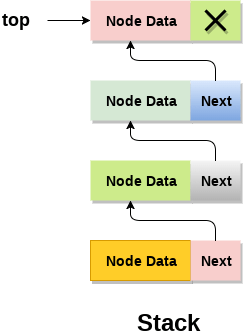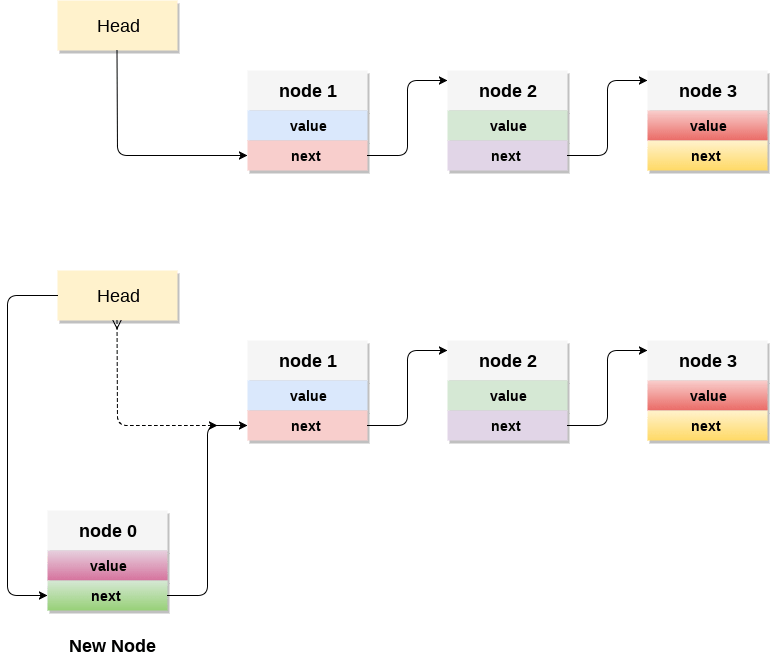📌 相关文章
- 数据结构-堆栈的数组实现
- 数据结构-堆栈
- 数据结构-堆栈(1)
- 堆栈数据结构(1)
- 堆栈数据结构
- 堆栈数据结构 c++ (1)
- 数据结构-队列的链表实现(1)
- 数据结构-队列的链表实现
- 堆栈实现 - C++ (1)
- 在C#中实现堆栈
- 在C#中实现堆栈(1)
- 堆栈数据结构python(1)
- 堆栈数据结构 c++ 代码示例
- 数据结构示例-使用链表实现二叉树(1)
- 数据结构示例-使用链表实现二叉树
- 在 cpp 中使用链表实现堆栈 - C++ (1)
- 数组是堆栈数据结构 (1)
- C#中的链表实现(1)
- C#中的链表实现
- 堆栈实现 - C++ 代码示例
- 在 cpp 中使用链表实现堆栈 - C++ 代码示例
- 堆栈数据结构python代码示例
- 数据结构 |堆栈 |问题2(1)
- 数据结构 |堆栈 |问题 4(1)
- 数据结构 |堆栈 |问题 4
- 数据结构 |堆栈 |问题 6
- 数据结构 |堆栈 |问题 3
- 数据结构 |堆栈 |问题 3(1)
- 数据结构 |堆栈 |问题 1
📜 数据结构-堆栈的链表实现
📅 最后修改于: 2020-10-15 00:55:58 🧑 作者: Mango
堆栈的链表实现
除了使用数组,我们还可以使用链接列表来实现堆栈。链表动态分配内存。但是,对于所有操作(即推,弹出和窥视),两种情况下的时间复杂度都是相同的。
在堆栈的链表实现中,节点不连续地保存在内存中。每个节点在堆栈中都包含一个指向其直接后继节点的指针。如果内存堆中剩余的空间不足以创建节点,则称堆栈溢出。

堆栈中最顶层的节点在其地址字段中始终包含null。让我们讨论在堆栈的链表实现中执行每个操作的方式。
将节点添加到堆栈(推送操作)
将节点添加到堆栈称为推入操作。在链表实现中将元素推送到堆栈与数组实现不同。为了将元素推入堆栈,需要执行以下步骤。
-
- 首先创建一个节点并为其分配内存。
- 如果列表为空,则将该项目作为列表的起始节点进行推送。这包括将值分配给节点的数据部分,并将null分配给节点的地址部分。
- 如果列表中已经有一些节点,那么我们必须在列表的开头添加新元素(以免违反堆栈的属性)。为此,请将起始元素的地址分配给新节点的地址字段,并使新节点成为列表的起始节点。
时间复杂度:o(1)

C实现:
void push ()
{
int val;
struct node *ptr =(struct node*)malloc(sizeof(struct node));
if(ptr == NULL)
{
printf("not able to push the element");
}
else
{
printf("Enter the value");
scanf("%d",&val);
if(head==NULL)
{
ptr->val = val;
ptr -> next = NULL;
head=ptr;
}
else
{
ptr->val = val;
ptr->next = head;
head=ptr;
}
printf("Item pushed");
}
}
从堆栈中删除节点(POP操作)
从堆栈顶部删除节点称为弹出操作。从堆栈的链表实现中删除节点与数组实现中的节点不同。为了从堆栈中弹出一个元素,我们需要遵循以下步骤:
-
-
- 检查下溢情况:当我们尝试从已经空的堆栈中弹出时,发生下溢情况。如果列表的头指针指向空,则堆栈为空。
- 相应地调整头指针:在堆栈中,仅从一端弹出元素,因此,必须删除头指针中存储的值,并且必须释放节点。头节点的下一个节点现在成为头节点。
-
时间复杂度:o(n)
C实现
void pop()
{
int item;
struct node *ptr;
if (head == NULL)
{
printf("Underflow");
}
else
{
item = head->val;
ptr = head;
head = head->next;
free(ptr);
printf("Item popped");
}
}
显示节点(遍历)
显示堆栈的所有节点需要遍历以堆栈形式组织的链表的所有节点。为此,我们需要遵循以下步骤。
-
-
- 将头指针复制到一个临时指针。
- 在列表的所有节点之间移动临时指针,并print附加到每个节点的value字段。
-
时间复杂度:o(n)
C实施
void display()
{
int i;
struct node *ptr;
ptr=head;
if(ptr == NULL)
{
printf("Stack is empty\n");
}
else
{
printf("Printing Stack elements \n");
while(ptr!=NULL)
{
printf("%d\n",ptr->val);
ptr = ptr->next;
}
}
}
C中的菜单驱动程序使用链表实现所有堆栈操作:
#include
#include
void push();
void pop();
void display();
struct node
{
int val;
struct node *next;
};
struct node *head;
void main ()
{
int choice=0;
printf("\n*********Stack operations using linked list*********\n");
printf("\n----------------------------------------------\n");
while(choice != 4)
{
printf("\n\nChose one from the below options...\n");
printf("\n1.Push\n2.Pop\n3.Show\n4.Exit");
printf("\n Enter your choice \n");
scanf("%d",&choice);
switch(choice)
{
case 1:
{
push();
break;
}
case 2:
{
pop();
break;
}
case 3:
{
display();
break;
}
case 4:
{
printf("Exiting....");
break;
}
default:
{
printf("Please Enter valid choice ");
}
};
}
}
void push ()
{
int val;
struct node *ptr = (struct node*)malloc(sizeof(struct node));
if(ptr == NULL)
{
printf("not able to push the element");
}
else
{
printf("Enter the value");
scanf("%d",&val);
if(head==NULL)
{
ptr->val = val;
ptr -> next = NULL;
head=ptr;
}
else
{
ptr->val = val;
ptr->next = head;
head=ptr;
}
printf("Item pushed");
}
}
void pop()
{
int item;
struct node *ptr;
if (head == NULL)
{
printf("Underflow");
}
else
{
item = head->val;
ptr = head;
head = head->next;
free(ptr);
printf("Item popped");
}
}
void display()
{
int i;
struct node *ptr;
ptr=head;
if(ptr == NULL)
{
printf("Stack is empty\n");
}
else
{
printf("Printing Stack elements \n");
while(ptr!=NULL)
{
printf("%d\n",ptr->val);
ptr = ptr->next;
}
}
}